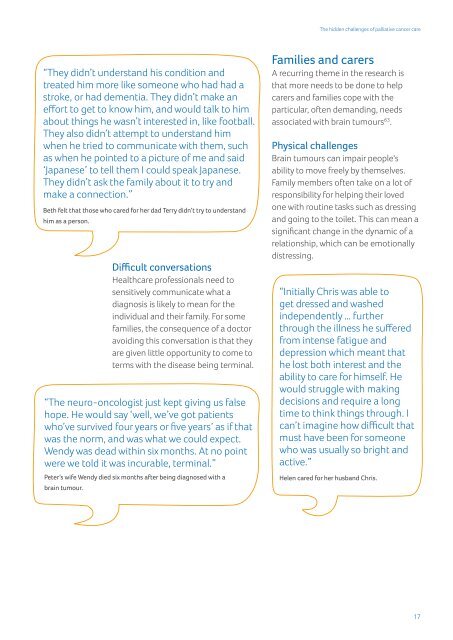The hidden challenges of palliative cancer care
hidden-challenges-palliative-cancer-care-report
hidden-challenges-palliative-cancer-care-report
You also want an ePaper? Increase the reach of your titles
YUMPU automatically turns print PDFs into web optimized ePapers that Google loves.
<strong>The</strong> <strong>hidden</strong> <strong>challenges</strong> <strong>of</strong> <strong>palliative</strong> <strong>cancer</strong> <strong>care</strong><br />
“<strong>The</strong>y didn’t understand his condition and<br />
treated him more like someone who had had a<br />
stroke, or had dementia. <strong>The</strong>y didn’t make an<br />
effort to get to know him, and would talk to him<br />
about things he wasn’t interested in, like football.<br />
<strong>The</strong>y also didn’t attempt to understand him<br />
when he tried to communicate with them, such<br />
as when he pointed to a picture <strong>of</strong> me and said<br />
‘Japanese’ to tell them I could speak Japanese.<br />
<strong>The</strong>y didn’t ask the family about it to try and<br />
make a connection.”<br />
Beth felt that those who <strong>care</strong>d for her dad Terry didn’t try to understand<br />
him as a person.<br />
Difficult conversations<br />
Health<strong>care</strong> pr<strong>of</strong>essionals need to<br />
sensitively communicate what a<br />
diagnosis is likely to mean for the<br />
individual and their family. For some<br />
families, the consequence <strong>of</strong> a doctor<br />
avoiding this conversation is that they<br />
are given little opportunity to come to<br />
terms with the disease being terminal.<br />
“<strong>The</strong> neuro-oncologist just kept giving us false<br />
hope. He would say ‘well, we’ve got patients<br />
who’ve survived four years or five years’ as if that<br />
was the norm, and was what we could expect.<br />
Wendy was dead within six months. At no point<br />
were we told it was incurable, terminal.”<br />
Peter’s wife Wendy died six months after being diagnosed with a<br />
brain tumour.<br />
Families and <strong>care</strong>rs<br />
A recurring theme in the research is<br />
that more needs to be done to help<br />
<strong>care</strong>rs and families cope with the<br />
particular, <strong>of</strong>ten demanding, needs<br />
associated with brain tumours 63 .<br />
Physical <strong>challenges</strong><br />
Brain tumours can impair people's<br />
ability to move freely by themselves.<br />
Family members <strong>of</strong>ten take on a lot <strong>of</strong><br />
responsibility for helping their loved<br />
one with routine tasks such as dressing<br />
and going to the toilet. This can mean a<br />
significant change in the dynamic <strong>of</strong> a<br />
relationship, which can be emotionally<br />
distressing.<br />
“Initially Chris was able to<br />
get dressed and washed<br />
independently … further<br />
through the illness he suffered<br />
from intense fatigue and<br />
depression which meant that<br />
he lost both interest and the<br />
ability to <strong>care</strong> for himself. He<br />
would struggle with making<br />
decisions and require a long<br />
time to think things through. I<br />
can’t imagine how difficult that<br />
must have been for someone<br />
who was usually so bright and<br />
active.”<br />
Helen <strong>care</strong>d for her husband Chris.<br />
17


